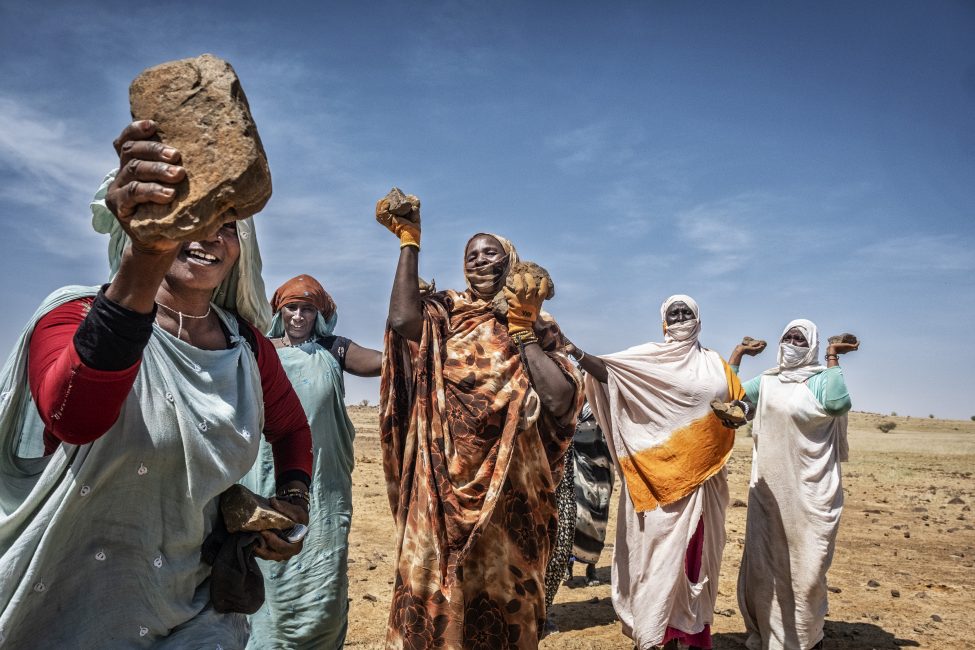Messabe Talhaya, 13 October 2021. It’s almost 1 pm, the sun is beating down and the temperature is 42 degrees. In the sweltering heat, twenty or so women of all ages are busy in the middle of nowhere. Around them, sandstone hills can be seen in the distance. Covered from head to toe in colourful veils, they contrast with the monotonous surroundings: an expanse of dry, dusty earth, strewn with monochrome pebbles and stones.
To say that the landscape now looks nothing like what it used to is an understatement: in Hassani, the local language, “messabe” means “catchment basin”, while the word “talhaya” refers to one of the region’s typical species of tree. On the horizon, however, there’s not a drop of water and only a handful of trees. The occasional rains have washed away the topsoil from the nearby hills, leaving pieces of rock in their wake. Now, nothing grows in this basin, much to the disappointment of local villagers, who used to grow their food there.
Water is scarce but it can also be destructive
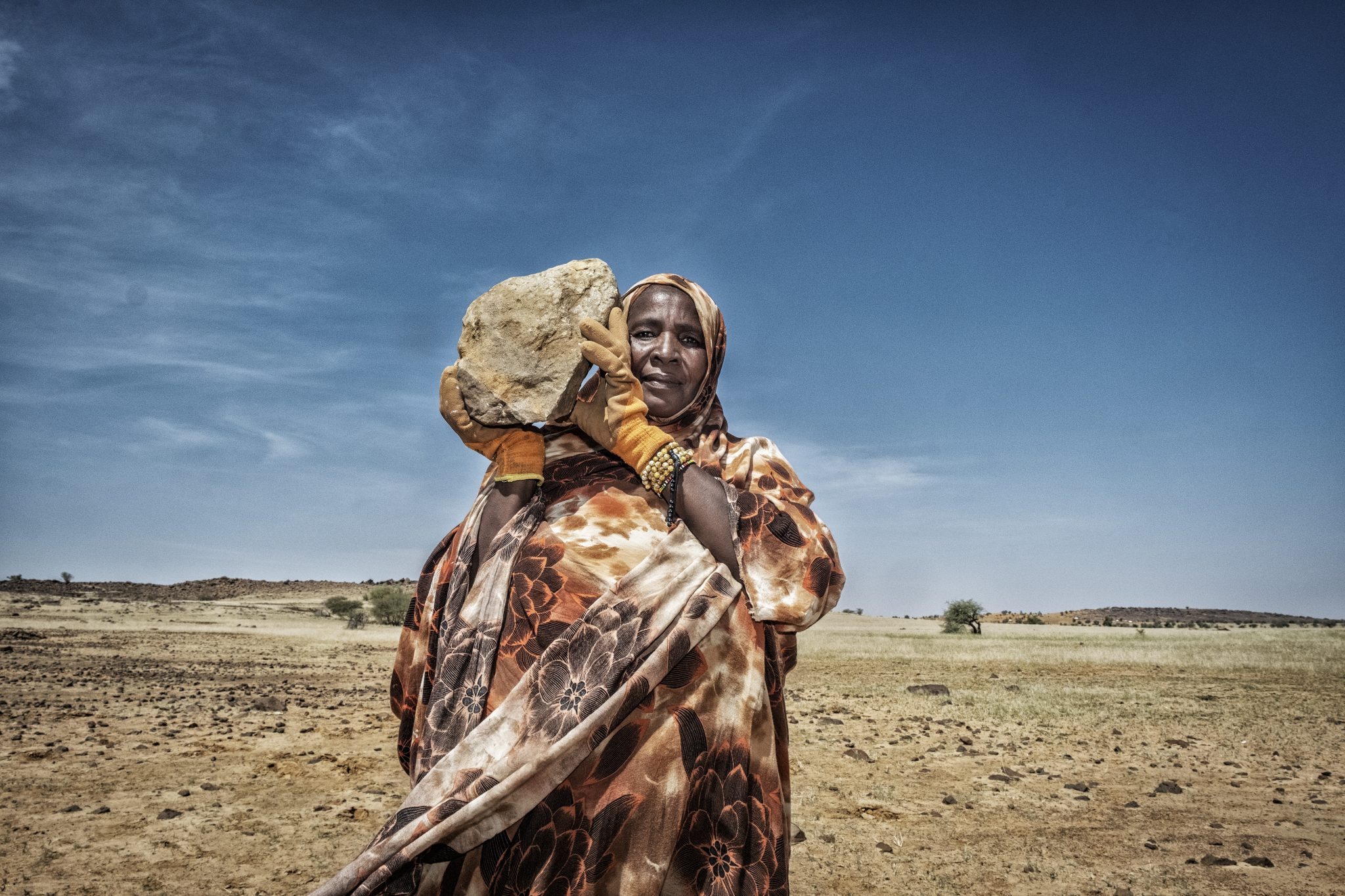
Fatimatou Salimah picking stones in the basin. © Tim Dirven
Fatimatou Salimah, a mother of two, was born in the village. Her family has always made a living from farming. “It’s increasingly difficult for us”, she explains, wearing an orange and brown veil with floral patterns. “We can’t grow anything here any more because there’s no water.” The problem has an impact on more than just crops and also affects the daily lives of the village’s women, who are responsible for fetching water. The village well dried up several years ago. The nearest one is 7 kilometres away. Every day, Fatima and her neighbours make their way there on carts pulled by donkeys. “It takes a minimum of three hours a day to bring back three or four twenty-litre cans. That’s just enough to cook with and give the animals something to drink. I also use the water to bathe the children and clean our clothes.”
The rain is eagerly awaited here but there’s also some trepidation: everyone knows that water can cause real damage. In recent years, heavy rains have caused land erosion, preventing plants from growing in the catchment basin. Fatimatou and the other women are working here today to tackle this very problem. For the past few days, they have been meeting here every morning to collect stones. They work from 8 am to 3 pm in the burning sun. The lucky ones use scrap metal sticks and wear gardening gloves as they dislodge the stones buried in the ground. They leave their heavy haul in the rusty boot of an old Toyota. It will then be transported and used to form sills to slow down the flow of water.
Sills to slow erosion
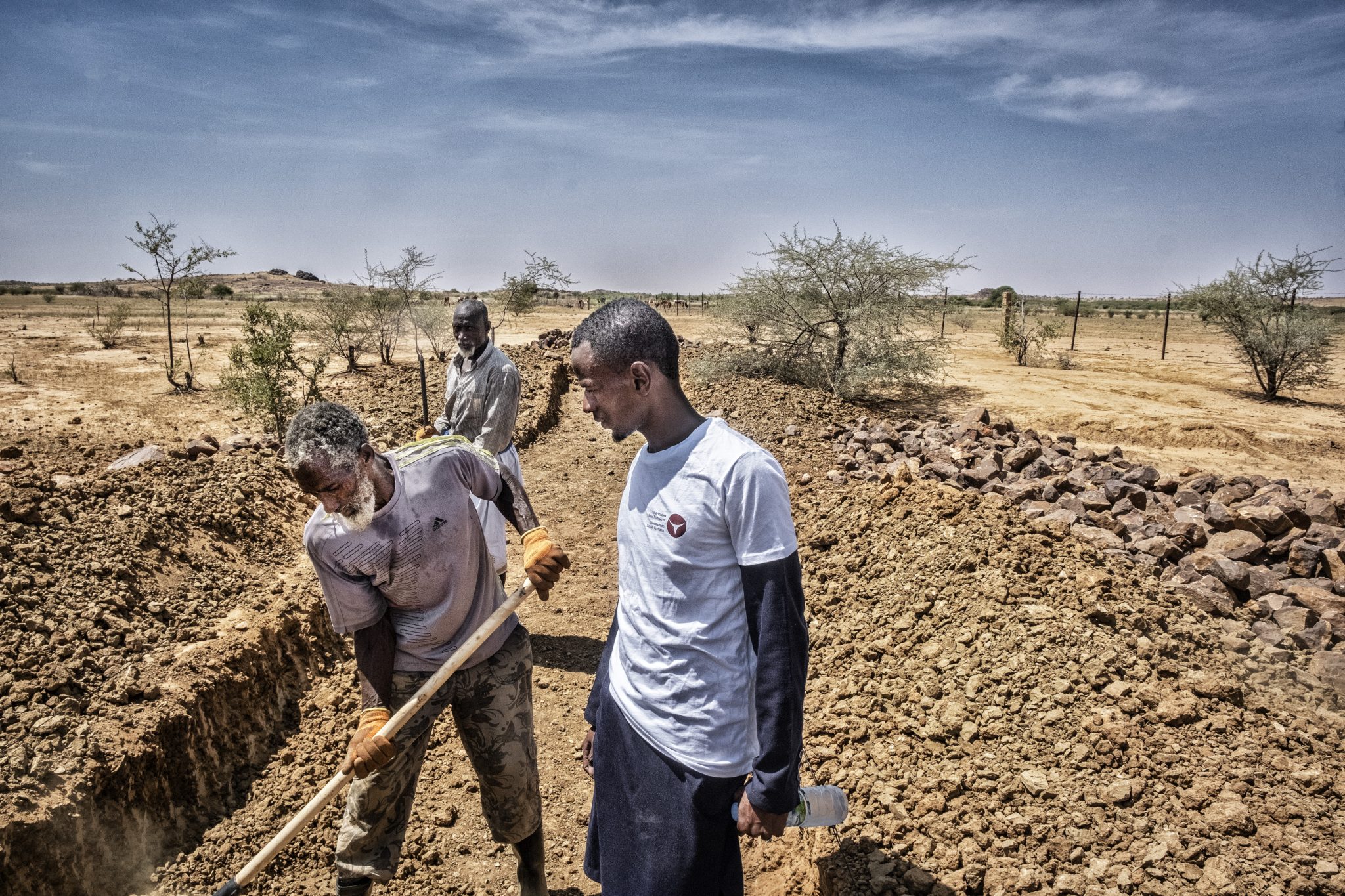
Hamadi Salif Sow, technical assistant for VSF Belgium, supervises the men constructing erosion sills. © Tim Dirven
A few kilometres away, a group of men is building a sill. Built at a strategic point, this artificial barrier will keep the land out of the basin while allowing water to flow in. Some people are busy tying up the gabions. They then fill them with the stones which the women have collected. Others have the more difficult task of digging a rectangle with a depth of 50 centimetres for the sill. The length of the sills varies from site to site, with some up to 220 metres long.
A total of three sills will be built around the village to protect the arable land. The principle is simple: deeply buried in the ground, the gabions retain the soil which is carried by heavy rain. Water passes through the mesh which traps plants, branches and foliage. In this way, water can irrigate the arable land, preserving the topsoil.
This is a real boon for an agro-pastoralist like Mohammed Hadou, in his sixties, who is helping to dig the sill. “You can’t imagine how important it is for a farmer like me”, he explains. “I usually grow millet, black-eyed peas and maize and I even do some market gardening. I don’t have enough crops to sell but at least I can provide for my family. But not this year: there was so little rain that there was nothing to harvest. There’s an old dam up there on the hill but it has collapsed and no longer holds water.”
Restoring nature and protecting livelihoods
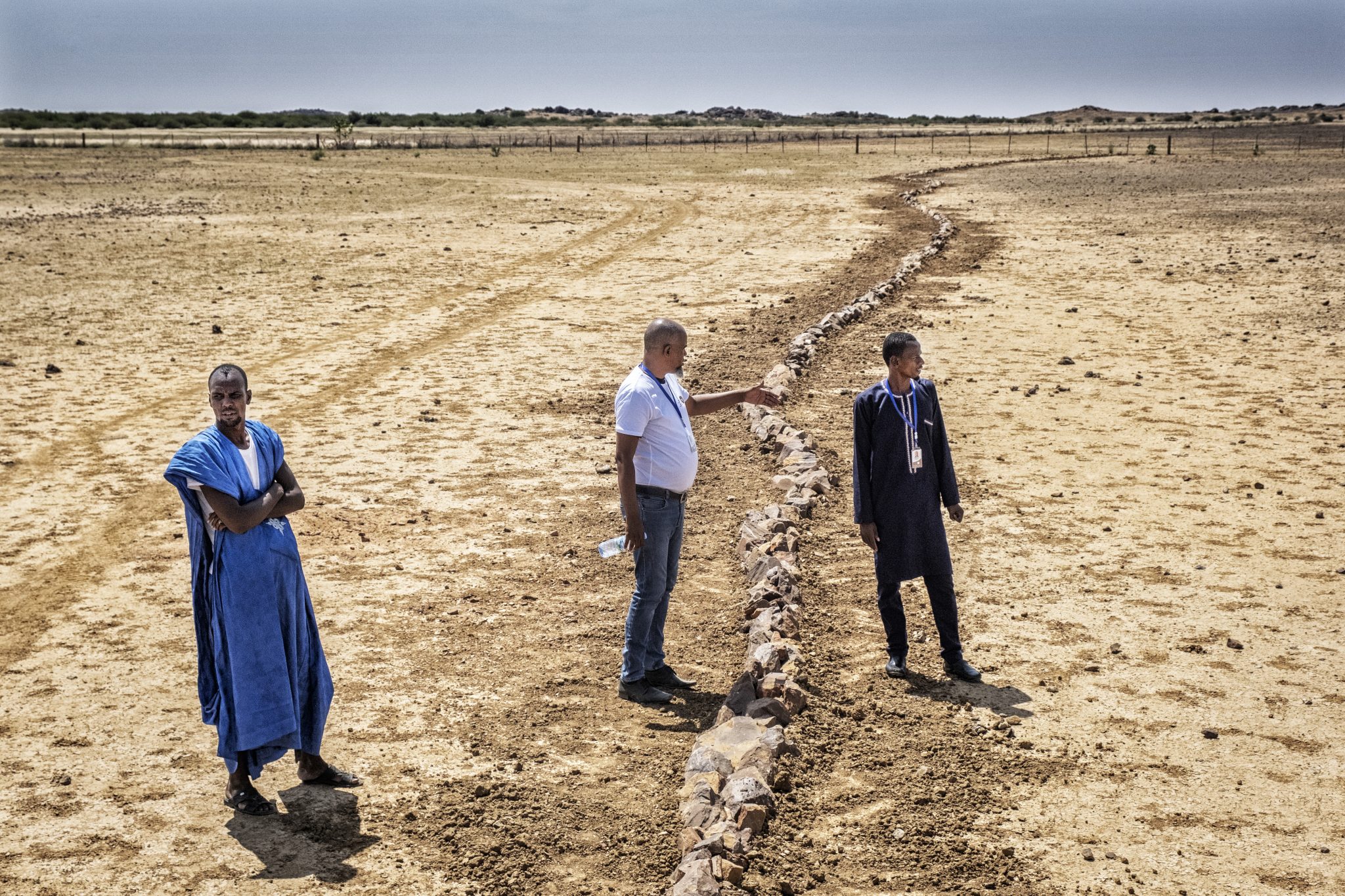
The VSF Belgium team observes the stone barriers recently installed in Messabe Talhaya to slow down erosion. © Tim Dirven
As with other villages in Assaba, our team has identified various sites to be restored in Messabe Talhaya, working with the country’s Ministries of Agriculture and the Environment. In addition to the three sills, the villagers have set up stone barriers over 13 hectares. These lines of stones on the ground also help to slow down the flow of water while preventing the earth from moving. The agro-pastoralists here are neither prepared nor equipped for work like this. This is where Vétérinaires Sans Frontières Belgium comes in.
For the past few months, our team has helped them to undertake this work, funded by Enabel. Sidya Saleck Chita, who oversees this project, says that their success depends on proper preparation and supervision. “This is the aim of our social engineering support. The preparatory phase begins about one and a half months before the start of the work. We bring the entire village together to tell them about the work which is going to be done and help them to get organised. The villagers elect a management committee to maintain and repair the new infrastructure. We offer technical, logistical and material support: we provide all the necessary equipment for the work.”
Despite the physical nature of the work, many villagers volunteer to participate. In addition to the added value of this infrastructure for the community, this enthusiasm can be explained by the fact that the work is paid. For every day spent working, Fatimatou, Mohamed and their colleagues receive 300 MRU (roughly 7 euros). In a region where the rural poverty rate is close to 84%, this income is invaluable in helping villagers to provide for their families.
“Without the sill, nothing could grow here any more”
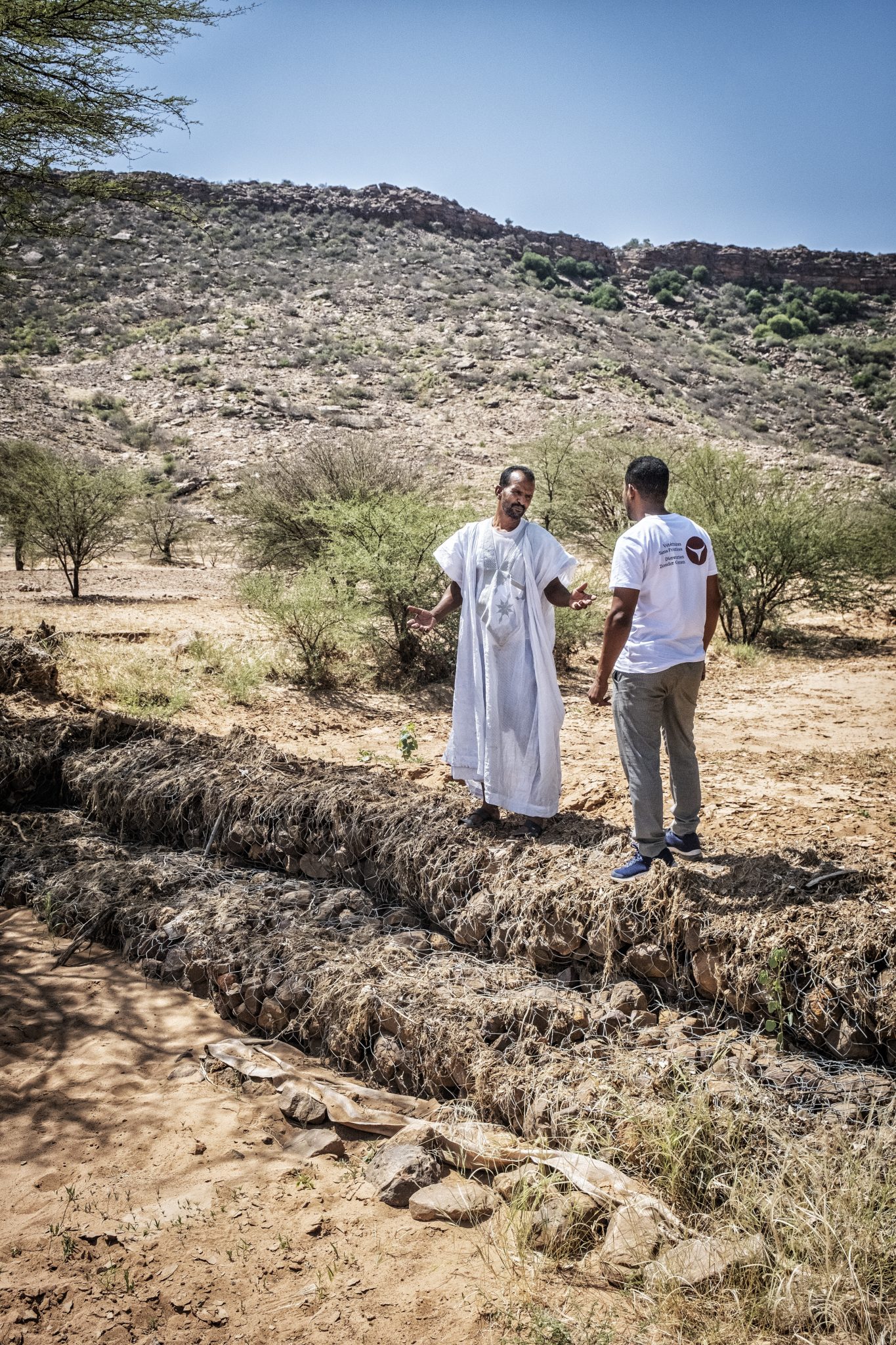
Mouhammed Ould Brahime, chairman of the comittee in Legrane, shows the benefits of erosion control sills. © Tim Dirven
At the moment, the agro-pastoralists of Messabe Talhaya haven’t yet had enough time to see the effects of the work. The situation is different in Legrane, a few dozen kilometres away. Mohammed Ould Brahime, the village chief and the chairman of the local committee, shows us around the restored sites. In July 2021, a team built two sills to slow down the flow of water by the hillsides. Three months later, after some rainfall, the smallest is already almost buried in the sand. This is an impressive illustration of how useful it is. “When we finished working, the sill was so high that I couldn’t see over it,” he explains to us from his position on the sill, now covered with dried vegetation. “Today, the land is almost at the same level. Without the sill, all this land would have ended up in the basin and nothing could grow here any more.”
The chairman then takes us to the local dam, built between December 2020 and June 2021 with Enabel’s support. Here too, rain falls so infrequently that the dam is almost dry. Nevertheless, its positive impact for farmers is already clear. A few metres below, Eli Mahatallah is tending to a small field of black-eyed peas. The farmer spent eight months helping to build the dam. “I used my earnings to feed my family but I kept some money to buy seeds. In late September, at the end of winter, the committee decided to open the spillway to water the plain. The water stored in the soil made it possible for Eli’s seeds to grow. “I’ll be able to harvest my black-eyed peas by late November”, the young father says happily. “The harvest should last me three months.” Then, like so many other people, Eli will have to start looking for work elsewhere to tide him over until the next harvest. Hopefully, there will be a better rainy season this time.
More information
Find more information and images about our work in Mauritania.
These activites are part of the RIMDIR programme, implemented by Enabel with financial support from the European Union.

